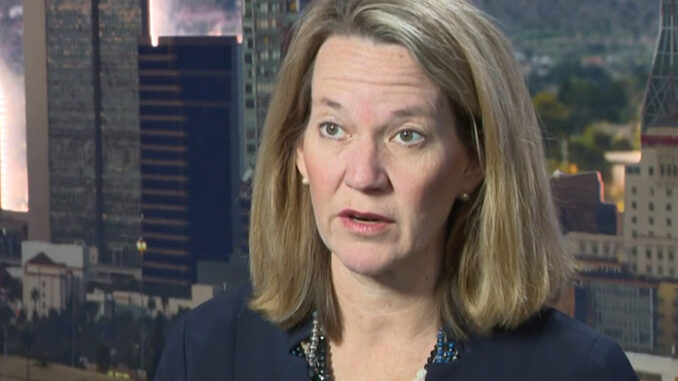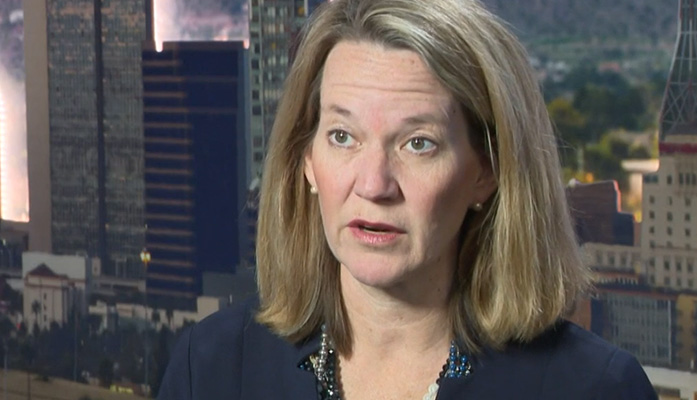
Arizona Attorney General Kris Mayes has relied on a plan from a dark money-fueled leftist nonprofit to prosecute president-elect Donald Trump’s supporters.
That nonprofit, States United Democracy Center (“SUDC,” formerly the “Voter Protection Program”), delivered a 50-page plan to Mayes last summer to prosecute Trump’s 2020 electors and backers for their “fake elector scheme,” as first reported by the Daily Signal. SUDC was also credited by mainstream media as part of the “shadow cabal” that ensured Trump’s loss in 2020.
Before being installed into the AG’s office, illegitimate @KrisMayes had never tried a case before.
So what does a climate change professor do when she wants to target conservatives, but has no idea how to do it?
She delegates to a far-left non-profit. https://t.co/WBefhoMlPt
— Abe Hamadeh War Room (@AbeWarRoom) November 22, 2024
The SUDC plan advised Mayes that she could issue the following felony criminal charges against Trump’s 2020 electors and backers: forgery, tampering with a public record, criminal impersonation, presentment of false instrument for filing, fraudulent schemes and artifices, and conspiracy. Their proposed charges included arguments for why those charges would stick. Indeed, Mayes did pursue those charges.
SUDC’s memo also advised Mayes to split Trump’s 2020 electors and backers into three categories, due to “differing levels of culpability.”
Proposed “Category 1” members were those who “directly organized or participated in the scheme in Arizona,” split into three subcategories: in-state organizers, including Jack Wilenchik, Greg Safsten, and Kelli Ward; out-of-state organizers, including Kenneth Chesebro, Rudy Giuliani, and Thomas Lane; and participants, or all the fake electors. Proposed “Category 2” members were those “who had some contact with organizers or fake electors in Arizona,” citing John Eastman, Boris Epshteyn, and Mark Meadows. Proposed “Category 3” members were merely those “who may have been involved,” naming Cleta Mitchell, Ronna McDaniel, and Trump himself.
In Arizona, @AZAGMayes is ramping up a criminal investigation into attempts to overturn the state’s presidential election results in 2020.https://t.co/lnKm9tHXr0
— States United Democracy Center (@statesunited) July 19, 2023
Trump’s reelection hasn’t deterred Arizona’s Democratic attorney general from seeing her case through. In the weeks following Trump’s win, Mayes has repeatedly pledged to continue her prosecution of Trump’s supporters.
“I have no intention of breaking that case up. I have no intention of dropping that case,” said Mayes in an interview with MSNBC days after Trump’s win. “A grand jury in the state of Arizona decided that these individuals who engaged in an attempt to overthrow our democracy in 2020 should be held accountable, so we won’t be cowed, we won’t be intimidated.”
Mayes has also vowed to oppose any conservative executive orders and legislative efforts from a Trump administration, namely concerning abortion and illegal immigration.
One of SUDC’s staffers, Ellen Pierce, was Mayes’ director of content and digital team from last February to May. Prior to that, Pierce was the communications transition advisor for Governor Katie Hobbs and a senior communications manager for former Governor Doug Ducey.
Another staffer, Alexander Atkins, joined SUDC from Elias Law Group, a key firm in countering pre-election and post-election challenges to the 2020 election.
SUDC was launched as part of the notorious 2020 “shadow campaign” a few weeks before the 2020 election (mid-October) by former President Barack Obama’s “Ethics Czar,” Norm Eisen; former Massachusetts chief deputy attorney general, Joanna Lydgate; and Christine Todd Whitman, former New Jersey governor, EPA administrator under President George W. Bush, and founding member of the Republican Leadership Council. The Progressive State Leaders Committee (PSLC) launched the nonprofit.
TIME magazine said SUDC was part of a “cabal of powerful people ranging across industries and ideologies, working together behind the scenes to influence perceptions, change rules and laws, steer media coverage and control the flow of information. They were not rigging the election; they were fortifying it.”
Eisen, SUDC senior advisor, was quoted in that TIME Magazine article celebrating their victory over Trump that year. Eisen also played a “critical” role in the first impeachment attempt against Trump by “building the case” while serving as special counsel to the House Judiciary Committee.
With over $14.5 million in revenue, SUDC has received millions from dark money organizations such as Arabella Advisors. It allows them to compensate their leadership and pay for their operations, which include nearly 60 staff members (excluding leadership).
Lydgate receives over $370,000 in compensation as the nonprofit’s president and CEO, initially the organization’s national director.
SUDC leaders who have received ample funding — per SUDC’s last publicly-available tax filing — were Jenn Fogel Bublic, former secretary and treasurer and now COO (former deputy executive director at the Democratic Attorneys General Association); Elizabeth “Lizze” Ulmer, communications director (former communications director for the Democratic Attorneys General Association and communications for Everytown for Gun Safety and Moms Demand Action for Gun Sense in America); Ranjana Natarajan, former senior counsel and now chief program officer (former director of the University of Texas at Austin School of Law); Thania Sanchez, former research director and now senior vice president (former ACLU director and Yale University professor); and Christine Sun, former legal director and now senior vice president (former special assistant to Xavier Becerra, when he was the California attorney general).
The nonprofit’s original advisory board was a massive group touted as a “bipartisan” coalition of high-ranking past attorneys general, presidential appointees, and law enforcement leaders.
SUDC’s first advisory board consisted of Grant Woods, former Arizona attorney general; Jeri L. Williams, former Phoenix Police Department chief of police; Jennifer Granholm, Michigan’s former governor and attorney general; Tom Ridge, former Pennsylvania governor, former congressman, and both Homeland Security secretary and first assistant under President George W. Bush; Bill Weld, former Massachusetts governor and both Massachusetts district attorney and assistant attorney general under President Ronald Reagan; Jack Conway, former Kentucky attorney general; Frankie Sue Del Papa; former attorney general and secretary of state for Nevada; John J. Farmer Jr., former assistant U.S. attorney, New Jersey attorney general, and senior counsel to the 9/11 Commission; Jim Hood, former Mississippi attorney general; Jahna Lindemuth, former Alaska attorney general; Patricia Madrid, former New Mexico attorney general; Tom Rath, former New Hampshire attorney general and Legal Services Corporation director under President George W. Bush; Art Acevedo, former Texas chief of police for Houston and Austin; Donald Ayer, deputy attorney general under President George H.W. Bush; Greg Bower, the FBI’s former assistant director and deputy general counsel, as well as Nevada district attorney under Presidents George W. Bush and Barack Obama; Peter J. Koutoujian, sheriff of Middlesex County, Massachusetts and former Massachusetts state lawmaker; Earnell R. Lucas, former Milwaukee County sheriff; Sarah R. Saldana, ICE director under President Barack Obama and former Texas district attorney; Joyce Vance, Alabama district attorney under President Barack Obama; and Ken Wainstein, Homeland Security Advisor under President George W. Bush, former first assistant attorney general for national security, Washington, D.C. attorney, FBI general counsel, and chief of staff to former director Robert Mueller.
The Biden administration tapped several of these advisory board members to serve: Granholm as secretary to the Department of Energy, Wainstein as head of the Justice Department’s National Security Division. Others went on to assist Kamala Harris in her unsuccessful bid as the Democratic Party’s replacement nominee for the presidency, through endorsements, “Republicans for Harris,” or other efforts: Ayer, Rath, Weld, and Whitman.

